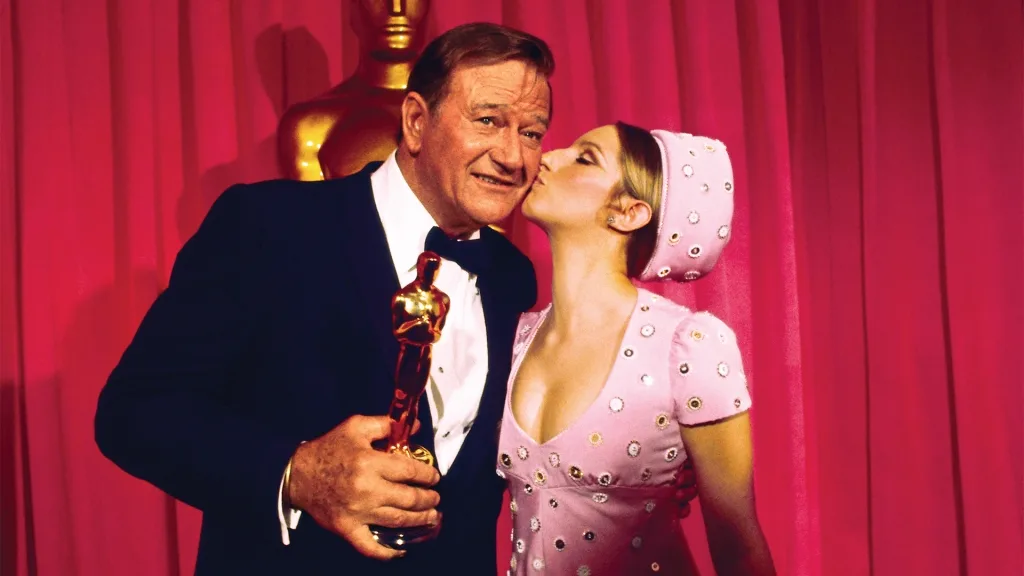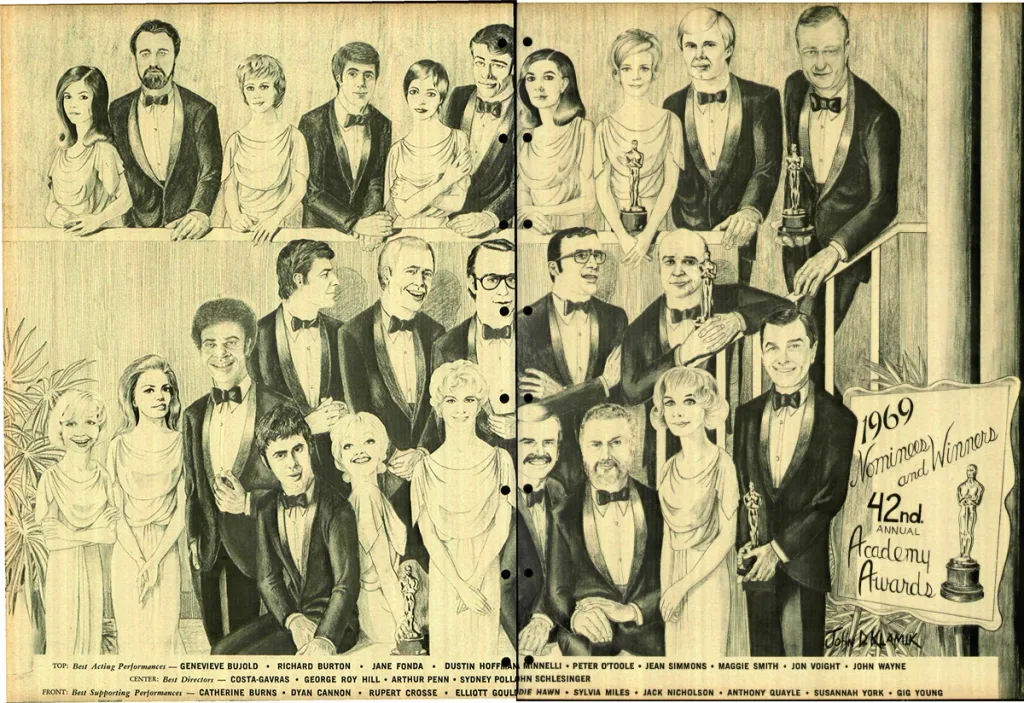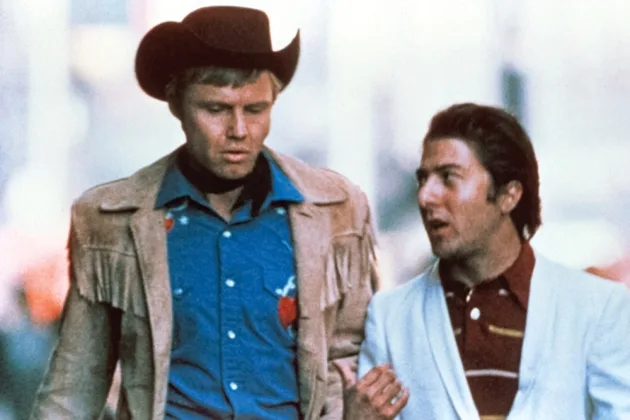It was supposed to be a night of celebration, but as the Academy Awards unfolded on April 7, 1970, there was a sense of anxiety and dissatisfaction gripping the movie business. Much like today, the industry was being divided by changing tastes and sensibilities, struggling to remain relevant in a period of social upheaval.
Just before Bob Hope took the stage at the Dorothy Chandler Pavilion to the familiar refrain of “Thanks for the Memory,” John Wayne introduced the comic as “everybody’s friend.” But in an opening monologue, Hope made it clear to the audience that he was aligned with one ideological group in Hollywood. And even as he smiled good-naturedly, the biting tone of his jokes revealed that he was none too pleased with the direction that the movies were heading in.
“This is really a night to remember,” Hope said. “It’s such a novelty seeing actors and actresses with their clothes on.” He went on to crack: “This will go down in history as the cinema season that proved that crime doesn’t pay, but there’s a fortune in adultery, incest and homosexuality.”
Looking back at the films that were up for top prizes at the 1970 ceremony, it’s easy to see what had Hope so animated. The film business was in the throes of a transition, straddling a new era of sexual freedom and maturity and the last gasps of Hollywood’s Golden Age, one rooted in nostalgia for an idealized version of America. In one corner was United Artists’ “Midnight Cowboy,” an X-rated, low-budget drama about two street hustlers who form a homoerotic bond, that had improbably become one of the biggest commercial hits of the year. It was filmed in New York, just as the city was descending into a period of particularly vice-ridden dysfunction.
In the other, was 20th Century Fox’s “Hello Dolly!,” a lavish G-rated musical, that was also set in New York City, but mostly shot on the studio’s Century City backlot. It too was one of the year’s highest-grossing films, but its massive (for the time) $25 million budget meant that it ended up losing money. Both movies were up for best picture, vying for the honor with “Anne of the Thousand Days,” a costume drama that, like “Hello Dolly!,” was very much a throwback to the kind of movie Hollywood used to make, as well as “Butch Cassidy and the Sundance Kid” and “Z,” harbingers of the kind of stylistic daring and narrative risks that characterized the new revolution in filmmaking.

But the film that may have best tapped into the zeitgeist didn’t score a best picture nomination. Made for just $400,000, “Easy Rider,” a low-budget indie about a pair of bikers traversing America, had become a totem of the counterculture, capturing the rebel spirit of the hippie movement. It would go on to gross $60 million, while launching the careers of Peter Fonda, Dennis Hopper and Jack Nicholson, who was nominated for best supporting actor. Hopper, Fonda and Terry Southern would score an original screenplay nod, though the film would lose out on both prizes. But what its financial success demonstrated was just how out of step the major studios were with popular mores. The old system of creating lavish period pieces like “Hello Dolly!” seemed discordant with the unsettled state of the world.
The divided nature of the movie business reflected the polarization gripping the nation. The ceremony that aired on ABC took place nine months after the Manson murders, eight months after Woodstock and two months before the Kent State shootings, unfolding against a backdrop of political activism and conservative backlash. Demonstrations against the Vietnam War were gripping the country, just as Richard Nixon had been swept into office promising to restore law and order while bringing “honorable peace” in Southeast Asia. Instead, he would spend much of 1969 and 1970 expanding the war by secretly approving military operations in Cambodia.
At the Oscars that night in April, “Midnight Cowboy” would prevail, becoming the first and thus far only X-rated movie ever to be named best picture, while “Hello Dolly!” would have to settle for minor awards honoring its score, art direction and sound design.
But that year’s acting winners would be a mixture of emerging and veteran talent. Goldie Hawn, part of a new wave of comedians, was named best supporting actress for “Cactus Flower,” while Maggie Smith, then primarily known for her stage work in the West End, scored an upset victory in the best actress category for “The Prime of Miss Jean Brodie.” Gig Young, a longtime character actor who had been on screen since 1940, won best supporting actor for “They Shoot Horses Don’t They.” And John Wayne, the cowboy star turned outspoken Vietnam War advocate, earned best actor for “True Grit.” His victory came at the expense of “Midnight Cowboy” stars Dustin Hoffman and Jon Voight, both of whom would go on to dominate the movie business in the 1970s while Wayne faded from view, a victim of changing attitudes and health problems.

In its recap the morning after, Variety summed up the ceremony. “Who says the new and old can’t coexist?” our reporter observed. “Last night’s [ceremony]…gave overwhelming testimony that Hollywood can recognize good filmmaking above and below the line regardless of age, subject matter or MPAA ratings.”
For United Artists, the company behind “Midnight Cowboy,” the 1970s would be characterized by an artistic flowering. In that decade alone, it produced such landmark works as “One Flew Over the Cuckoo’s Nest,” “Last Tango in Paris” and “Annie Hall.” That renaissance would prove short lived, however, ending just 10 years later with the debacle of “Heaven’s Gate.”
For 20th Century Fox, the early part of that decade would be marred by financial issues. But the company would reemerge in 1977 with the release of a little film called, “Star Wars.” A movie that, like “Midnight Cowboy” in 1970, signaled another shift in the film business — a move away from auteur-driven stories and toward franchiseable spectacles.
By then, of course, many of the same stars who had been part of the new wave of talent reforming the industry had become part of the establishment themselves. Hawn, Nicholson, Hoffman and Voight would all have at least one Oscar on their mantelpiece by the time the ’80s dawned and were now as much a part of the Hollywood elite as Wayne and Hope were on that April evening.

